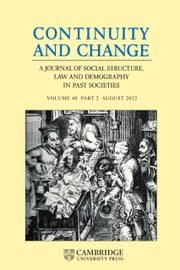The law of nature has a long and impressive history. Centuries of thoughtful and learned jurists – from the ancient Greeks and Romans to the founding fathers of the American republic – admired it and found it useful. William Blackstone endorsed and often turned to it – no small recommendation for the lawyers in the new American republic. Its merits in history are impressive. Natural law long inspired the enactment of positive law. In its application it also played a significant part in deciding disputes brought before American courts of law.
Today, however, natural law has fallen out of use among American lawyers. True, it does have its modern adherents. They urge and sometimes predict a revival of its fortunes. But no such revival has yet occurred. Natural law has largely disappeared from instruction in our law schools and also from the reports of cases heard in American law courts. The more common judgement among lawyers today echoes that of Harvard Law School's Professor John Chipman Gray (1839-1915). He described natural law as an ‘exploded superstition’. Oliver Wendell Holmes (1841-1935) used even stronger language; he regarded it as the product of ‘class prejudices naively imagined to be eternal laws’. A movement away from acceptance of the law of nature's utility among lawyers began in the second half of the nineteenth century, and today it is virtually complete.
What accounts for this change? Answering that question is the subject of Stuart Banner's most recent book. Its coverage is limited to developments in the United States, but in that field he has cast his nets widely in his search for satisfactory explanations, and he has uncovered several. Many of them were internal to law practice itself. For example, jurists often disagreed about the practical conclusions to be drawn from the tenets of natural law. Did it permit slavery, for instance? Some thought not. Slavery's existence was a clear violation of the principle that all men were by nature ‘equally free and independent’ (p. 149). But others thought the reverse. Slavery was ‘coeval and coextensive with human nature’ (p. 150). In consequence of this continued disagreement, natural law itself lost some of its attraction. It was too inconclusive to apply. The existence of a written Constitution in the United States also played a significant role in the decline. The famous early American Supreme Court case of Calder v. Bull (1789) was held to have established that wherever overlap existed between natural law's tenets and the U. S. Constitution's provisions, as was often true, the latter was to be preferred. It provided a sound conclusion, or at least what seemed to be a more useful conclusion. As the results of this decision worked their way into common practice, natural law's utility also declined. Often it was simply ignored. And it fell under a cloud for that reason. A third source of the contraction of natural law's utility occurred almost accidentally. It was the product of the rise of the publication of case reports. Lawyers today can scarcely imagine how difficult it once was for lawyers to discover and make use of reports of decided cases. There were no official reporters, no computers, no West Publishing Company. What reports of cases then existed were the result of assiduous lawyers whose accounts were meant to assist them in their own careers. Others also found them useful. When the change in reporting occurred, the expansion in numbers of reported cases created ‘a mighty sea of books’ that illustrated the reasoning found in decided cases. The reports thus became the standard source of legal argument. The law of nature was thus an accidental casualty of what the author calls ‘The Substitution of Precedents for Principles’. A fourth salient factor was a product of what the book describes as the separation of law from religion. It did not happen all at once, and this movement did not turn most American lawyers into atheists. However, it did increasingly relegate religious opinions to the private side of life. A blasphemous statement, for instance, became a matter for individual judgement and private criticism rather than the occasion for a public prosecution in a court of law. The law of nature, assumed to be a part of Christianity, was an incidental casualty of this change. Religion's decline did not banish moral arguments from the decision of actual cases, but it did require American judges to find justification for them outside a traditional invocation of the law of nature.
Was there anything else? Were other factors involved? There are possibilities – Charles Darwin's theory of evolution is certainly one of them. The law of nature held that when men (and women) were created, their creator endowed them with an innate knowledge of certain moral truths, truths that stayed with them. These truths remained, unchanged even though they were not always observed perfectly in the world. If, however, the human race was not so created – if it was product of a struggle for survival among creatures that ended in the survival of the fittest – then a fundamental basis for natural law's existence necessarily came into question. Social Darwinism, so well explored in modern histories, was the result, and the law of nature was an inevitable casualty of its basic assumption. I may have missed it, but I saw no mention of Darwin's influence or even his existence in the book; his name does not appear in the index.
Even if this explanation seems likely, its omission is not a criticism of the coverage of the book under review. It is simply food for thought. Lawyers – their assumptions and their work in the American law courts – are the subjects of Banner's book. And that he has covered very well. It is a good book – thoughtful, magisterial, and engagingly written.



